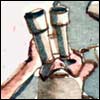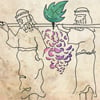What is the legacy we are bequeathing to our children? Will their core values reflect our own? Will we receive nachas from them? What more can we do to encourage our children to proceed on the proper path? No parent is immune from these troublesome thoughts. This week's Torah portion offers some insight into this all-important issue.
The division of the Land of Israel amongst the Israelite families was imminent. Zelophehad's daughters approached Moses with their grievance:
"Our father died in the desert…as a consequence of his own sin, and he had no sons. Why should our father's name be eliminated from his family because he had no son? Give us a portion along with our father's brothers."
When Moses conveyed their complaint to G‑d, he was informed that they were indeed correct, and the daughters of Zelophehad received a portion in the Land together with the rest of their tribe.
Who was Zelophehad, the father of these courageous women?Who was Zelophehad, the father of these courageous women? And what sin did he commit which cost him his life? The Talmud1 cites two opinions regarding his identity: Rabbi Akiva maintains that Zelophehad was the "mekoshesh," the individual who was executed for gathering wood in the public domain on Shabbat;2 Rabbi Judah ben Betaira contends that Zelophehad was a member of the "ma'apilim," the ill-fated group which tried to "go it alone" to Canaan after it was decreed that the generation would perish in the desert. This entire group was massacred by the Amalekites and Canaanites.3
Interestingly, whether Zelophehad was the mekoshesh or one of the ma'apilim, he died for a noble cause. The Sages explain that – strange as this may sound – the mekoshesh desecrated the Shabbat "for the sake of Heaven." After the generation was condemned to spend the rest of their days in the desert, many Israelites mistakenly assumed that being banned from entering the Holy Land meant that they were no longer G‑d's holy nation, and their mitzvot or transgressions were of no consequence anymore. To dispel this erroneous assumption, the mekoshesh deliberately committed a capital crime to demonstrate through his death that their actions were still significant. The mekoshesh died because of his love for his fellow Jews.
The ma'apilim died because of their love for the Holy Land. Their love was so intense that it blinded their senses causing them to disregard Moses' stern admonition that their mission was not sanctioned by G‑d and would not succeed.
"The apple doesn't fall far from the tree." Zelophehad's altruistic action struck a chord within his daughters. They, too, were consumed with a love for the Land of Israel, and were willing to do whatever necessary to realize their dream of owning a parcel of its holy soil. Note that the episodes involving the mekoshesh and the ma'apilim occurred in the second year after the Exodus, while Zelophehad's daughters registered their complaint approximately 38 years later. Many years after his death, Zelophehad's legacy was alive and well; his offspring continuing where he left off.
The lesson is plain: If we want our children to share our values, our values cannot remain in the realm of theory—they must be translated into actions. Only if we make the tough decisions demanded by our principles can we hope to have an impact on our children.
Do we love our children enough to be ourselves what we want them to be?







Join the Discussion